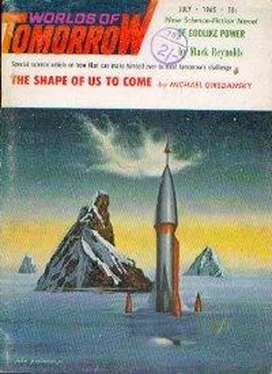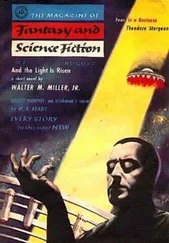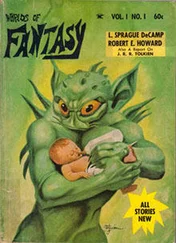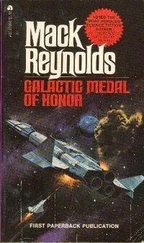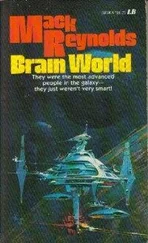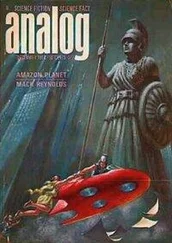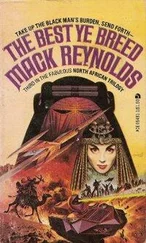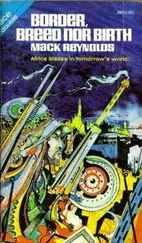Mack Reynolds - Earth Unaware
Здесь есть возможность читать онлайн «Mack Reynolds - Earth Unaware» весь текст электронной книги совершенно бесплатно (целиком полную версию без сокращений). В некоторых случаях можно слушать аудио, скачать через торрент в формате fb2 и присутствует краткое содержание. Год выпуска: 1965, Издательство: Galaxy Publishing Corp., Жанр: Фантастика и фэнтези, на английском языке. Описание произведения, (предисловие) а так же отзывы посетителей доступны на портале библиотеки ЛибКат.
- Название:Earth Unaware
- Автор:
- Издательство:Galaxy Publishing Corp.
- Жанр:
- Год:1965
- ISBN:нет данных
- Рейтинг книги:4 / 5. Голосов: 1
-
Избранное:Добавить в избранное
- Отзывы:
-
Ваша оценка:
- 80
- 1
- 2
- 3
- 4
- 5
Earth Unaware: краткое содержание, описание и аннотация
Предлагаем к чтению аннотацию, описание, краткое содержание или предисловие (зависит от того, что написал сам автор книги «Earth Unaware»). Если вы не нашли необходимую информацию о книге — напишите в комментариях, мы постараемся отыскать её.
First published as
.
Earth Unaware — читать онлайн бесплатно полную книгу (весь текст) целиком
Ниже представлен текст книги, разбитый по страницам. Система сохранения места последней прочитанной страницы, позволяет с удобством читать онлайн бесплатно книгу «Earth Unaware», без необходимости каждый раз заново искать на чём Вы остановились. Поставьте закладку, и сможете в любой момент перейти на страницу, на которой закончили чтение.
Интервал:
Закладка:
It was Westbrook’s turn to shake his head. “Sounds good, but it doesn’t work out that way. You can’t put more into a container than its capacity to hold. Average I.Q. is one hundred. Half the population is below that and you can subject most of them to education for life and it’s not going to take.”
The exhausted prophet was in there pitching. “No, your belief is a common fallacy. True, average I.Q. is one hundred, but actually few of us go more than ten points either above or below that figure. The moron is as seldom found amongst us as is the genius with his I.Q. of 140 or above. The less than one percent who are geniuses are precious gifts to the race and should be sought out and given every opportunity to develop their talents, and cherished. Those who fall below 90 in their I.Q. are our unfortunates and every effort should be made, in all charity, to see that they lead as full lives as possible.”
Dwight Hopkins said smoothly, “I thought your basic complaint was against our affluent society and the Welfare State. But here you develop the usual do-gooder philosophy. All men are equal, so we should sacrifice the products of the successful to those who have lost the race.”
Tubber brought himself up more erect. “Why are we so contemptuous of the so-called do-gooder? Is it so reprehensible to attempt to do good? Man would seem to be his own worst enemy. We all claim to desire peace, but at the same time sneer at the conscientious objector. We claim to desire a better world, and then sneer at those who suggest reform as do-gooders. But that is beside the question you ask. My objection to the welfare state and our present society is not that we have solved the problems of production, but that the machine has slipped beyond our control and runs amuck. I do not begrudge the productive person the product of his efforts. The right to products is exclusive, but the right to means should be common. This is so, not merely because raw materials are provided by the All Mother, by nature, but also because of the heritage of installations and techniques which is the real source of human wealth and because of the collaboration that makes each man’s contribution so much more effective than if he worked in solitude. But this question of rewarding the more intelligent while penalizing he whom the All-Mother saw fit to equip with a lower I.Q. is no longer pertinent. In an economy of scarcity, it is obvious that the greatest contributors to society should reap greater rewards, but in our affluent society why should we begrudge anyone an abundance? We have never begrudged either air nor water to our meanest criminal because there has always been an abundance of both. In the affluent society, the meanest citizen can have a decent home, the best of food, clothing and the other necessities and even luxury. I would be a fool indeed, if I railed against this.”
General Crew rumbled, “What is this, a sermon? Let’s get to the point. Does this man admit to—somehow or other—creating the disturbances that have hashed up what amounts to all our entertainment media? If so, there should be laws that…”
“Shut up,” Ed Wonder told him, without inflection.
The general looked at him unbelievingly, but obeyed orders.
Jim Westbrook said, “We got away from the original point. Our Ezekiel Tubber, here, believes that he can change the present admittedly chaotic society by changing the eternal slob who is the basic unit of society. He can’t. I would think he would have seen reality when the mob attacked him, as soon as they found it was he who robbed them of their idiot diversions.”
Tubber had recovered enough to glare at him. “Your common man, as you called him before, has been made a slob, it is not inherent. My efforts have been to attempt to remove some of the devices that have been utilized to gouge out his brains. Almost any one of these slobs, as you call them, could have been, could still be, I contend, a worthy pilgrim along the path to Elysium. Suppose you took the child of a highly educated, well-to-do family, and, in the hospital, through a nurse’s mistake, had it substituted for a slum child. Do you think for a moment that the slum child, in its new environment, wouldn’t average out as well as his fellows? Or that the good family’s offspring, through mistake now being raised in the poorest part of town, wouldn’t average out the same as his fellows?”
Nefertiti glared around at them. She said, “Father…” but then turned to Hopkins and then to Ed. “He’s tired. He ought to have a doctor. Those people, they kicked him, hit him.”
“The eternal slobs,” Westbrook murmured, dryly.
Ed Wonder said, “Just one more minute, honey.” He turned to Tubber. “All right, suppose we concede everything you’ve said, so far. Under the Welfare State the country is going to pot, and what we ought to do is change it the way you’d like to see it changed. But I want to remind you of something you said to me the first time we talked together. I think I can remember it, almost exactly. I called you sir, and you said: The term sir, a variation of sire, comes down to us from the feudalist era. It reflects the relationship between noble and serf. My efforts are directed against such relationships, against all authority of one man over another. For I feel that whoever puts his hand on me to govern me is a usurper and a tyrant; I declare him to be my enemy .”
“I fail to understand your point, loved one.”
Ed pointed a finger at him. “You object to others controlling you, your thoughts, your actions. But that is exactly what you, with your power—whatever it is—have been doing to all the rest of us. All of us. You, the supposed do-gooder, to use that term again, are in fact the biggest tyrant of all history. Genghis Khan was a piker, Caesar an upstart, Napoleon, Hitler and Stalin small timers. Compared with…”
“Stop!” Tubber cried.
“What comes next?” Ed demanded, making his voice contemptuous. “Are you going to rob us of speech, so that we can’t even complain against your decisions?”
Tubber looked at him, the Lincolnesque sadness there as never before, the hurt manifest.
“I… I didn’t know. I… thought…”
Dwight Hopkins moved in smoothly. “I suggest a compromise, sir, ah, that is, Ezekiel. You for all your efforts have failed to bring your message—whatever its merits or lack of them—to the people whom you love but who have thus far rejected you. Very well, my compromise is this. That for one hour each day you shall be on the air. On every TV and radio throughout the world. There shall be, for that hour, no other programs to compete with you. This one hour a day shall be yours, so long as you wish it.”
Both Nefertiti and her prophet father were staring at him.
“And… in return?” Tubber wavered.
“In return, all your, ah, hexes, shall be lifted.”
The shaken prophet hesitated. “Even though I were on the air each day, perhaps they would not listen.”
Buzz De Kemp chuckled around his stogie. “That’s no problem, Zeke, old chum. One more hex. Your very last one, you should promise. A hex urging everyone to listen. Not necessarily to believe in your program, but merely to listen.”
“I… I don’t even know if it is possible to reverse…”
“We can try,” Dwight Hopkins urged smoothly.
General Crew said, thoughtfully. “Come to think of it, I have three daughters. Since that curse against cosmetics and vanity, life has been more bearable. I can even get into the bathroom in the morning. Couldn’t we just retain that one?”
“The one against juke boxes,” Braithgale murmered. “I loathe juke boxes.”
“My own pet peeve,” Buzz said, rolling his stogie from one side of his mouth to the other, “is comic books. I’d say…”
Читать дальшеИнтервал:
Закладка:
Похожие книги на «Earth Unaware»
Представляем Вашему вниманию похожие книги на «Earth Unaware» списком для выбора. Мы отобрали схожую по названию и смыслу литературу в надежде предоставить читателям больше вариантов отыскать новые, интересные, ещё непрочитанные произведения.
Обсуждение, отзывы о книге «Earth Unaware» и просто собственные мнения читателей. Оставьте ваши комментарии, напишите, что Вы думаете о произведении, его смысле или главных героях. Укажите что конкретно понравилось, а что нет, и почему Вы так считаете.
